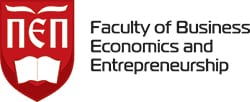The emphasis is on a synergy of traditional learning, modern innovation, the quality of the curriculum and speed of adoption of new skills and capabilities in the area of activity
The formula of the Faculty of Business Economics and Entrepreneurship is slightly different from other higher education institutions, simply because in its curriculum the Faculty places an emphasis on practical education and apprenticeships.
In just under 10 years, you have become a respectable scientific institution. What are your experiences after the first decade of work?
– Initially, we only had departments for business economics and entrepreneurship.

During these past years, working in education, I’ve gained a certain degree of experience, of course, new friends, new colleagues, and through all this, I managed fit myself into all these trends regarding education. It was very difficult in this market between 2008 and today because there is a lot of unfair competition.
Unfortunately, our state recognizes this but does not react, therefore all those schools and educational institutions that work in accordance with the law have very big problems. These others are trying other, easier ways to find students and – you will agree – all students prefer to learn less and get a faculty diploma faster. We do things completely differently, but regardless of everything, we keep to our enrolment policy and are happy with the way we work.
What programmes do you offer your students and where do you place an emphasis: diploma, knowledge, skills and ability to run one’s own business, large and small companies…?
– The emphasis is on a synergy of traditional learning, modern innovation, the quality of the curriculum and speed of adoption of new skills and capabilities in the area of activity. This is a school that teaches its students to run an independent business, solve problems and have a successful business.
We have contracts with a very large number of companies, so students completing our faculty have a very good success rate with finding jobs
The curricula are in line with global trends so that students can become competitive in the domestic and international labour market during the studies. Support for the implementation of this approach to education is provided by experienced highly educated teaching staff, small mentor groups, learning schedules that follow and respect the individuality and interests of each student to adopt the necessary knowledge in the best and most efficient way, as well as organized apprenticeships in leading banking and business organizations and institutions in the country and abroad. We have contracts with a very large number of companies, therefore students completing our faculty have a very good success rate with finding jobs.
Thus, our formula is a bit different than other higher education institutions, simply because in our curriculum we place an emphasis on practical education (apprenticeships).
In earlier times young people from the provinces had to enrol in faculties and schools in large cities. Today, a diploma from your school can be acquired by young people from Jagodina, Čačak and Loznica without incurring the cost of living outside the parental home. Is this a trend in education?
– That’s right. We thought of young, promising people who want to continue their education but are unable to move or travel daily to lectures. We have accredited centres in the above towns, and this certainly represents a considerable contribution, both to young people, as well as the towns that retain their youth.
Who are those who most frequently opt for distance learning? How is it different from regular attendance of lectures and what are its advantages?
– With “distance studies” (online studies) we are on the road to providing an even greater influx of foreign students from certain countries, we are in contact with many countries regarding future cooperation and education with us. These studies are intended not only for foreign students but also employed people in Serbia, because the online programme is very flexible and allows students to choose their own time of “attending” class.